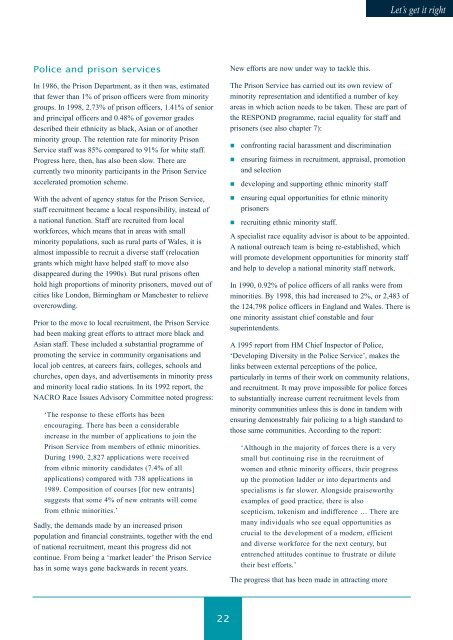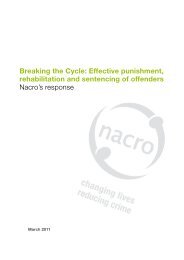Let's get it right: race and justice 2000 - Nacro
Let's get it right: race and justice 2000 - Nacro
Let's get it right: race and justice 2000 - Nacro
- No tags were found...
You also want an ePaper? Increase the reach of your titles
YUMPU automatically turns print PDFs into web optimized ePapers that Google loves.
Let’s <strong>get</strong> <strong>it</strong> <strong>right</strong>Police <strong>and</strong> prison servicesIn 1986, the Prison Department, as <strong>it</strong> then was, estimatedthat fewer than 1% of prison officers were from minor<strong>it</strong>ygroups. In 1998, 2.73% of prison officers, 1.41% of senior<strong>and</strong> principal officers <strong>and</strong> 0.48% of governor gradesdescribed their ethnic<strong>it</strong>y as black, Asian or of anotherminor<strong>it</strong>y group. The retention rate for minor<strong>it</strong>y PrisonService staff was 85% compared to 91% for wh<strong>it</strong>e staff.Progress here, then, has also been slow. There arecurrently two minor<strong>it</strong>y participants in the Prison Serviceaccelerated promotion scheme.W<strong>it</strong>h the advent of agency status for the Prison Service,staff recru<strong>it</strong>ment became a local responsibil<strong>it</strong>y, instead ofa national function. Staff are recru<strong>it</strong>ed from localworkforces, which means that in areas w<strong>it</strong>h smallminor<strong>it</strong>y populations, such as rural parts of Wales, <strong>it</strong> isalmost impossible to recru<strong>it</strong> a diverse staff (relocationgrants which might have helped staff to move alsodisappeared during the 1990s). But rural prisons oftenhold high proportions of minor<strong>it</strong>y prisoners, moved out ofc<strong>it</strong>ies like London, Birmingham or Manchester to relieveovercrowding.Prior to the move to local recru<strong>it</strong>ment, the Prison Servicehad been making great efforts to attract more black <strong>and</strong>Asian staff. These included a substantial programme ofpromoting the service in commun<strong>it</strong>y organisations <strong>and</strong>local job centres, at careers fairs, colleges, schools <strong>and</strong>churches, open days, <strong>and</strong> advertisements in minor<strong>it</strong>y press<strong>and</strong> minor<strong>it</strong>y local radio stations. In <strong>it</strong>s 1992 report, theNACRO Race Issues Advisory Comm<strong>it</strong>tee noted progress:‘The response to these efforts has beenencouraging. There has been a considerableincrease in the number of applications to join thePrison Service from members of ethnic minor<strong>it</strong>ies.During 1990, 2,827 applications were receivedfrom ethnic minor<strong>it</strong>y c<strong>and</strong>idates (7.4% of allapplications) compared w<strong>it</strong>h 738 applications in1989. Compos<strong>it</strong>ion of courses [for new entrants]suggests that some 4% of new entrants will comefrom ethnic minor<strong>it</strong>ies.’Sadly, the dem<strong>and</strong>s made by an increased prisonpopulation <strong>and</strong> financial constraints, to<strong>get</strong>her w<strong>it</strong>h the endof national recru<strong>it</strong>ment, meant this progress did notcontinue. From being a ‘market leader’ the Prison Servicehas in some ways gone backwards in recent years.New efforts are now under way to tackle this.The Prison Service has carried out <strong>it</strong>s own review ofminor<strong>it</strong>y representation <strong>and</strong> identified a number of keyareas in which action needs to be taken. These are part ofthe RESPOND programme, racial equal<strong>it</strong>y for staff <strong>and</strong>prisoners (see also chapter 7):confronting racial harassment <strong>and</strong> discriminationensuring fairness in recru<strong>it</strong>ment, appraisal, promotion<strong>and</strong> selectiondeveloping <strong>and</strong> supporting ethnic minor<strong>it</strong>y staffensuring equal opportun<strong>it</strong>ies for ethnic minor<strong>it</strong>yprisonersrecru<strong>it</strong>ing ethnic minor<strong>it</strong>y staff.A specialist <strong>race</strong> equal<strong>it</strong>y advisor is about to be appointed.A national outreach team is being re-established, whichwill promote development opportun<strong>it</strong>ies for minor<strong>it</strong>y staff<strong>and</strong> help to develop a national minor<strong>it</strong>y staff network.In 1990, 0.92% of police officers of all ranks were fromminor<strong>it</strong>ies. By 1998, this had increased to 2%, or 2,483 ofthe 124,798 police officers in Engl<strong>and</strong> <strong>and</strong> Wales. There isone minor<strong>it</strong>y assistant chief constable <strong>and</strong> foursuperintendents.A 1995 report from HM Chief Inspector of Police,‘Developing Divers<strong>it</strong>y in the Police Service’, makes thelinks between external perceptions of the police,particularly in terms of their work on commun<strong>it</strong>y relations,<strong>and</strong> recru<strong>it</strong>ment. It may prove impossible for police forcesto substantially increase current recru<strong>it</strong>ment levels fromminor<strong>it</strong>y commun<strong>it</strong>ies unless this is done in t<strong>and</strong>em w<strong>it</strong>hensuring demonstrably fair policing to a high st<strong>and</strong>ard tothose same commun<strong>it</strong>ies. According to the report:‘Although in the major<strong>it</strong>y of forces there is a verysmall but continuing rise in the recru<strong>it</strong>ment ofwomen <strong>and</strong> ethnic minor<strong>it</strong>y officers, their progressup the promotion ladder or into departments <strong>and</strong>specialisms is far slower. Alongside praiseworthyexamples of good practice, there is alsoscepticism, tokenism <strong>and</strong> indifference … There aremany individuals who see equal opportun<strong>it</strong>ies ascrucial to the development of a modern, efficient<strong>and</strong> diverse workforce for the next century, butentrenched att<strong>it</strong>udes continue to frustrate or dilutetheir best efforts.’The progress that has been made in attracting more22

















